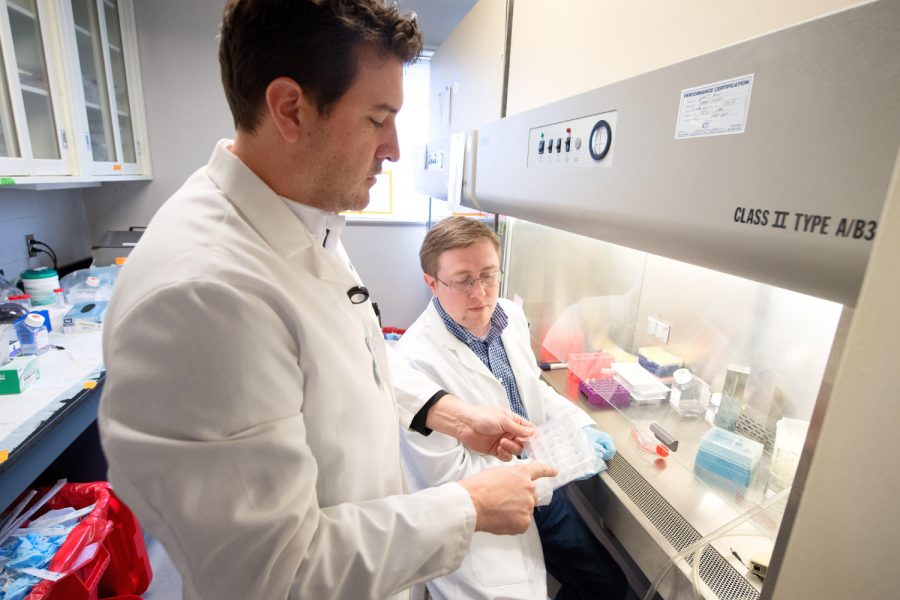UI research leads to possible treatment for diabetes, fibrosis
Researchers at the UI collaborated with the University of Milan on a new chemical that could treat fibrosis.
Ethan J Anderson , PhDAssociate Professor, Department of Pharmaceutical Sciences and Experimental Therapeutics and his lab that conducts Translational Pharmacology and basic science research in the College of Pharmacy Building.
December 10, 2018
In a recent international collaboration, researchers at the University of Iowa worked with scientists at the University of Milan, Italy, to create a new molecule that could help treat disorders related to obesity.
The molecule, called carnosinol, is nearly identical to a different protein called carnosine that already exists in our bodies, said Ethan Anderson, a UI professor of Pharmacy.
Carnosine is present mainly in the muscles, heart, and brain. Anderson said the protein works similar to an antioxidant: It removes a number of bad chemicals in our bodies that cause disease.
“It’s like a sponge that cleans up all the gunk,” he said.
The carnosine present in our bodies decreases as we age, Anderson said. Every decade past the age of 50 sees a 15 to 20 percent reduction in carnosine. Carnosine is present in food, but the body breaks it down very quickly.
Carnosinol was created by researchers at the University of Milan and then tested at the UI by Anderson and his colleagues. Carnosinol was designed to be a more resilient version of carnosine, said Giancarlo Aldini, a researcher at the University of Milan, in an email to The Daily Iowan.
“They just made a slight change chemically to carnosine and made it an alcohol,” Anderson said.
In his lab, he began the process by feeding mice a high-fat and high-sugar diet to make them obese. He said the mice became insulin-resistant and showed all the signs of Type 2 diabetes. Additionally, the liver and heart became very unhealthy.
The next phase in the process was to mix carnosinol into the drinking water of the mice and observe the effects. The mice became much healthier over the next few months. Their glucose levels returned to normal, and they became insulin-sensitive again.
“They remained obese, but what happened was, over the course of the next 10 to 12 weeks, it totally reversed all of the disorders,” Anderson said.
RELATED: UI study dives into new batch that could replace needle-administered drugs
While carnosinol hasn’t been tested on humans yet, the researchers said it has potential to treat a number of disorders related to obesity. In addition to combating fibrosis and diabetes, Anderson said, the chemical could reduce the risk of heart attack and stroke.
“Carnosinol could be useful to reduce the chronic inflammatory response … involved in several chronic diseases, including atherosclerosis and cardiometabolic diseases,” Aldini said in his email.
UI graduate research assistant Blake Monroe, who was a co-author on the paper, studied the effects of carnosinol on fibrosis in the liver of the mice, showing positive effects.
“Treatment of carnosinol ameliorated the formation of liver fibrosis in diabetic and obese mice,” he said.
This was not the first time an analog of carnosine has been made, but Anderson said that it has shown the most promise. He said the UI College of Pharmacy is working on different ways to use the natural effects of carnosine.
Anderson said it is unclear when carnosinol will move on to human trials. The commercial rights to the chemical are held by Flamma, an Italian chemical company.
“It certainly will lead to some type of carnosine-based therapy,” Anderson said.





















